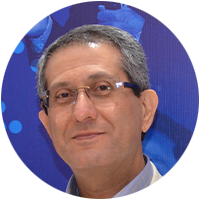Emad S B Saweeres | Training to Teach in Medicine

For the past two decades, Emad S B Saweeres participated in a variety of intensive training programs aimed at preparing him to teach other medical professionals. While all of them were helpful, he points out that Harvard Medical School’s Training to Teachers Program, offered in conjunction with the Ministry of Health and Population in Egypt (which has since been renamed to Training to Teach in Medicine and is now offered to a broader audience) “was by far the best one.”
Saweeres works as a professor and head of the Orthopaedic Department at the El-Sahel Teaching Hospital and is a consultant orthopaedic surgeon at the Good Shepherd Hospital, both in Cairo, Egypt. He also holds a number of other prestigious roles. This includes serving on the Regional Faculty for AOTrauma, where he chaired basic and advanced courses and was the head of the training committee of the Egyptian Fellowship Board.
With such a breadth of responsibilities to manage, he decided to attend Harvard’s teacher training program because he wanted to take his teaching skills to another level, as well as to gain a deeper understanding of the nuances of effective curriculum development so he could help create a high-caliber medical training program in his own country.
Recognizing the Harvard Medical School Difference
“Although I have participated in several other training programs, I have seen nothing like Harvard’s approach,” he points out. For instance, Harvard Medical School has a six-month curriculum—longer than most other programs—and it takes an evidence-based approach.
Harvard also uses a learning management system with case studies, assignments, and group discussions. “Harvard’s immersion workshop that followed the training program, as a reward for high achievers, was also extremely useful and inspiring, with a focus on teamwork, leadership, and feedback,” Saweeres adds.
Throughout the span of the Harvard program, he points out that he was also “surprised by the level of instruction and the variation of assignments we were given, including an educational video, essay, and capstone project,” he says. In particular, he found the emphasis on the capstone project as the ultimate design and application of learned theory to be especially valuable.
Building a Training Program in Egypt
Saweeres and his colleagues, including five others from Egypt who also attended the Harvard training program, have now designed a smaller version of the program in Egypt, called Excellence in Education, that serves as an important vehicle to train others and get everyone speaking the same language.
“What makes this Excellence in Education unique is that we followed the scientific method of curriculum development and active teaching techniques that Harvard uses,” he explains.
Specifically, the efforts to design this program included tailoring the curriculum to meet identified needs and making the lectures very interactive. It also included a formal way to measure the success of the efforts and make any necessary improvements.
However, it’s particularly interesting to note that the faculty of the Excellence in Education training could not agree on the exact teaching approach to take for the different sessions. This is because they all came from different backgrounds and experience levels.
Ultimately, they took two different approaches to teaching and are now tracking the results. Some of the teachers followed traditional teaching methods, which involves introducing the course material to students during the session time in which they are discussed.
Others who attended the Harvard program, including Saweeres, tried a flipped classroom technique they learned there. This requires sharing the classwork with students before the lesson to give them time to familiarize themselves with the material so that during class time, they can discuss it on a deeper level.
Saweeres says they plan to share the results of their experiment in a scientific journal.
A Worthwhile Investment of Time and Effort
He also points out that overall, he has found the lessons he learned at Harvard Medical School inspiring. He admits that he faced the challenge of finding ways to manage the classwork required while also meeting the professional responsibilities of his teaching load. Yet, he says that any stress he encountered in the process was well worth it.
“I found real value in the emphasis on more active teaching and learning techniques, as well as incorporating theory and medical research in designing teaching episodes,” he notes.
In addition, he gained a better understanding of the United States graduate medical education system, which is helping him translate the model to get the most out of an Egyptian version of this standard.
He also points out that for anyone else considering taking this program, it’s important to understand that it’s very hard work. But he also says that for those who are willing to put in the investment of time and energy involved, the level of knowledge and skills they gain will change their teaching style forever and is well worth the effort.
Learn more about Training to Teach in Medicine.
Written by Lisa D. Ellis